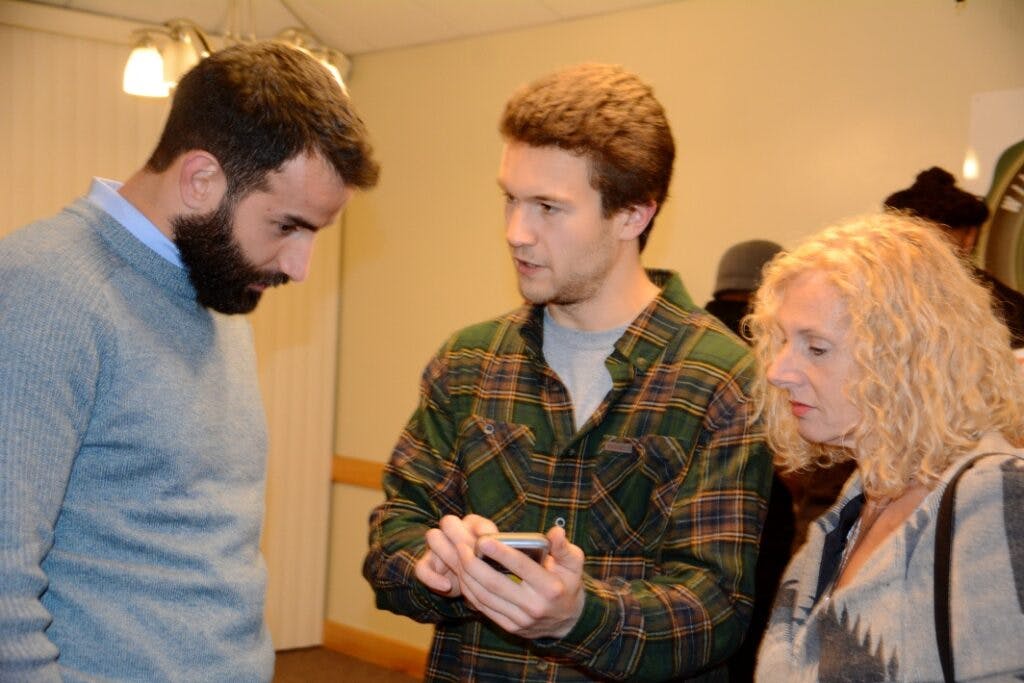Iraqi Refugee Shares His Plight from Baghdad to Columbus: ‘The U.S. is the Dreamland!’
Murtahda Al-Shaikhli recalls, as a boy from the vantage point of his family’s home, watching American and allied aircraft bombard Baghdad at the start of the Iraq War in 2003. Little could he imagine then that, 15 years later, he’d be living in Columbus, Ohio.
PICTURED: Senior Mike Smith (CENTER) shows photos from a recent trip to Morocco to Murtahda Al-Shaikhli as political science professor Dr. Marlaina Leppert-Wahl looks on.
Al-Shaikhli shared his remarkable story as a refugee from Iraq at an event called “Building a Longer Table” hosted Nov. 14 by Wilmington College’s chapter of Amnesty International. The dinner, which brought members of the campus community into direct contact with an actual refugee, is a local expression of world’s largest, grassroots, human rights organization’s initiative of building support for refugees.
The 27-year-old Al-Shaikhli explained how his family was unable to stay in Iraq when, after the fall of Saddam Hussein, civil war broke out and the country was divided by factions of Islam. Al-Shaikhli‘s mother is Shi’a Muslim and his father is an Arab Sunni so he, his parents and three siblings fled to Jordan and later Egypt, initially hoping the situation in Iraq stabilized enough for their safe return.
After three years in Egypt, Al-Shaikhli and his brother went to Ukraine, where they studied at a university with him ultimately earning a Bachelor of Science in civil engineering.
Meanwhile their family applied for refugee status for resettlement in the United States, which was approved in 2012; however, since the two sons were then in Ukraine, they were not covered by the action. Al-Shaikhli was required to return to Iraq as a requirement of applying separately to rejoin his family. Finally, in 2016, he had his first interview.
The official questioned his apparent continuing affiliation in Iraq and wrote on his file: REFUSED. “I Googled what ‘refused’ means.”
He realized the hopelessness of returning to Iraq: “There is no freedom, no clean water and electricity only two or three hours a day — there is no future there,” he said. So, Al-Shaikhli persevered and prepared himself for his next chance. Unable to count to 10 in English, he intensively studied the language by reading 164 books in eight months.
Then, in August 2017, he received the message he was hoping for from the U.S. Embassy: APPROVED. “I read it like 50 times!” he said, noting he arrived in Columbus in January 2018 for a reunion with his family, who had no idea he was coming.
“I didn’t see them for six years. My father didn’t recognize me,” he said in showing a cell phone video of the emotional reunion taken by the social worker who picked him up at the airport.
Al-Shaikhli realizes how lucky he is. Very few refugees are able to resettle in the United States these days,
He credits the organization known as CRIS — Columbus Refugee and Immigration Services — with aiding his rapid and ongoing assimilation into American society. CRIS provides immigrants and refugees with assistance involving such services as resettlement, employment and English language skills,
Sarah Huffman, a community engagement VISTA member with CRIS, accompanied Al-Shaikhli to Wilmington College.
“Our goal is to bring all refugees to self-sufficiency,” she said.
After five months in America, Al-Shaikhli attained a job as a structural engineer. He was hired a week after his interview, implying the company believed the government provided a competent vetting process. His sister and brother are a dentist and doctor, respectively.
“I’ll keep working to make the American government not regret they accepted me, and other refugees,” he said. “We are very lucky.
The U.S. is the dreamland!”
